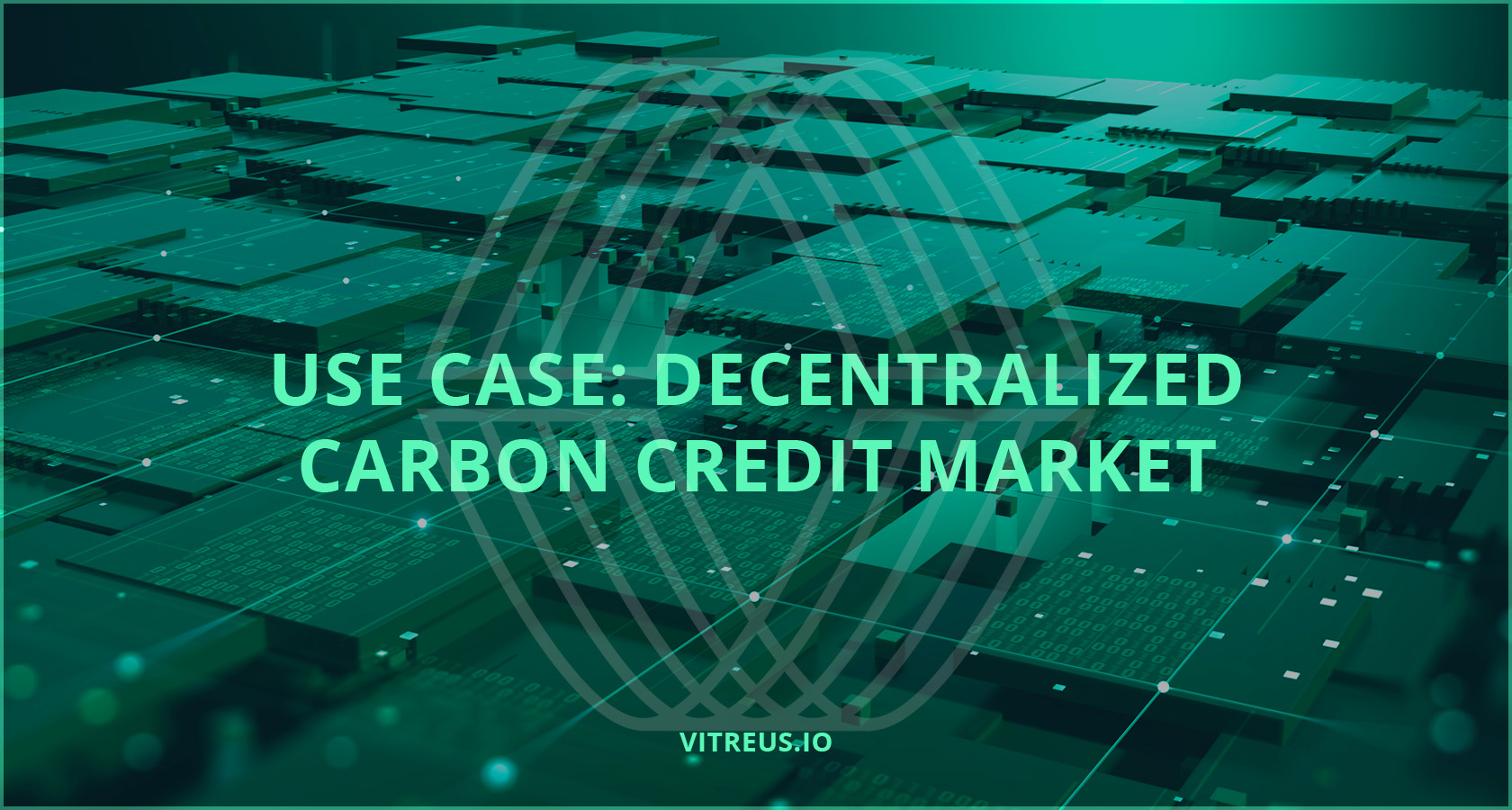Overview
As companies and governments strive to reduce their carbon emissions, the carbon credit market has emerged as a critical tool for offsetting environmental impacts. Vitreus’ decentralized ecosystem supports a transparent, secure marketplace for carbon credit trading, empowering organizations to offset emissions in real-time. By leveraging blockchain technology, Vitreus ensures the authenticity and accountability of carbon credits, reducing the risks of double-counting or fraudulent claims. This approach helps organizations meet their sustainability goals while fostering trust and efficiency in the carbon credit market.
Key Features and Benefits
1. Decentralized Carbon Credit Trading
2. Transparency and Accountability with Blockchain
3. Global Accessibility and Interoperability
4. Tokenization and Incentivization
5. Decentralized Governance and Market Regulation
Practical Application Scenario
Imagine a multinational corporation needing to offset its carbon emissions:
Why Vitreus is Ideal for Carbon Credit Markets
Impact on Carbon Trading and Sustainability
Conclusion
Vitreus is transforming the carbon credit market by providing a decentralized, transparent, and scalable platform for trading carbon credits. Its ecosystem empowers organizations to offset emissions in real-time, while ensuring trust and accountability in the market. By integrating blockchain technology, Vitreus supports global sustainability efforts and accelerates the transition to a greener future.
The journey doesn’t stop here! Join the conversation and stay ahead in the Web3 revolution by following us on X and connecting with our vibrant community on Discord. Let’s build the future together—one block at a time. Learn more at Vitreus.io!
As companies and governments strive to reduce their carbon emissions, the carbon credit market has emerged as a critical tool for offsetting environmental impacts. Vitreus’ decentralized ecosystem supports a transparent, secure marketplace for carbon credit trading, empowering organizations to offset emissions in real-time. By leveraging blockchain technology, Vitreus ensures the authenticity and accountability of carbon credits, reducing the risks of double-counting or fraudulent claims. This approach helps organizations meet their sustainability goals while fostering trust and efficiency in the carbon credit market.
Key Features and Benefits
1. Decentralized Carbon Credit Trading
- Peer-to-Peer Marketplace: Vitreus enables a decentralized marketplace where companies, governments, and individuals can buy, sell, or trade carbon credits directly without intermediaries. This reduces transaction fees and increases market efficiency.
- Real-Time Offsetting: Organizations can purchase carbon credits to offset their emissions in real-time, ensuring immediate compliance with sustainability goals and regulatory requirements. Smart contracts automatically execute these trades, making the process seamless.
2. Transparency and Accountability with Blockchain
- Immutable Records of Carbon Credits: All carbon credit transactions are recorded on the Vitreus blockchain, providing an immutable and verifiable audit trail. This ensures that credits are tracked transparently, reducing the risk of double-counting or fraudulent claims.
- Smart Contracts for Carbon Management: Vitreus enables the automation of carbon credit issuance and retirement using smart contracts. For instance, when a company purchases credits, smart contracts automatically retire the corresponding credits, ensuring they cannot be reused.
3. Global Accessibility and Interoperability
- Cross-Platform Trading: Through Vitreus’ Layer-0 infrastructure, carbon credits can be traded across multiple platforms, blockchains, and regulatory environments. This interoperability enhances market liquidity, allowing credits to flow freely between different carbon credit registries and markets worldwide.
- Integration with Global Sustainability Initiatives: Vitreus supports global carbon reduction efforts by integrating with existing carbon credit registries and sustainability programs, ensuring that credits are aligned with internationally recognized standards such as the Verified Carbon Standard (VCS) and the Gold Standard.
4. Tokenization and Incentivization
- VTRS Token Integration: Vitreus uses VTRS tokens to facilitate carbon credit transactions, creating a seamless, tokenized marketplace. Organizations can also stake VTRS tokens to gain access to exclusive carbon offset projects or to participate in decentralized governance over the marketplace.
- Incentives for Sustainable Practices: Organizations that actively reduce emissions or invest in green technologies can receive tokenized rewards within the Vitreus ecosystem, encouraging continued investment in sustainability.
5. Decentralized Governance and Market Regulation
- Community-Driven Carbon Credit Management: Through Vitreus’ Protocol DAO, stakeholders in the carbon credit market can participate in decision-making processes related to the issuance, trading, and regulation of carbon credits. This decentralized governance model ensures that the market remains transparent, fair, and aligned with the broader goals of environmental protection.
- Automated Carbon Credit Issuance: Carbon credits can be issued to projects that meet predefined sustainability criteria. For example, smart contracts could automatically issue credits to renewable energy projects, afforestation initiatives, or carbon capture technologies, providing real-time rewards for eco-friendly actions.
Practical Application Scenario
Imagine a multinational corporation needing to offset its carbon emissions:
- Real-Time Carbon Offsets: The company purchases carbon credits from verified renewable energy projects through the Vitreus marketplace. A smart contract automatically records the transaction, retires the credits, and updates the company's carbon footprint in real-time.
- Transparency and Trust: The blockchain provides a transparent, immutable record of the transaction, which can be audited by regulators and shareholders to verify the company’s compliance with sustainability goals.
Why Vitreus is Ideal for Carbon Credit Markets
- Transparency: By recording all transactions on the blockchain, Vitreus provides a fully transparent marketplace where the provenance and legitimacy of carbon credits can be easily verified.
- Efficiency: Decentralized P2P trading reduces the need for intermediaries, lowering transaction costs and increasing the speed and efficiency of carbon credit trading.
- Scalability: Vitreus’ Layer-0 infrastructure enables the carbon credit market to scale globally, accommodating multiple platforms and cross-border transactions seamlessly.
Impact on Carbon Trading and Sustainability
- Enhanced Market Trust: Vitreus’ decentralized and transparent platform increases trust in the carbon credit market, encouraging broader participation from companies, governments, and individuals.
- Accelerated Emissions Reduction: By making carbon credit trading more accessible and efficient, Vitreus helps accelerate the global transition to a low-carbon economy, supporting organizations in meeting their emissions reduction targets.
- Fostering Innovation: The tokenization of carbon credits through VTRS incentivizes the development of innovative carbon reduction projects, including renewable energy initiatives, reforestation efforts, and carbon capture technologies.
Conclusion
Vitreus is transforming the carbon credit market by providing a decentralized, transparent, and scalable platform for trading carbon credits. Its ecosystem empowers organizations to offset emissions in real-time, while ensuring trust and accountability in the market. By integrating blockchain technology, Vitreus supports global sustainability efforts and accelerates the transition to a greener future.
The journey doesn’t stop here! Join the conversation and stay ahead in the Web3 revolution by following us on X and connecting with our vibrant community on Discord. Let’s build the future together—one block at a time. Learn more at Vitreus.io!









